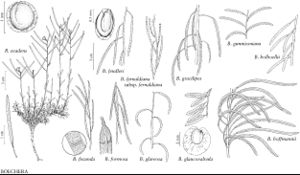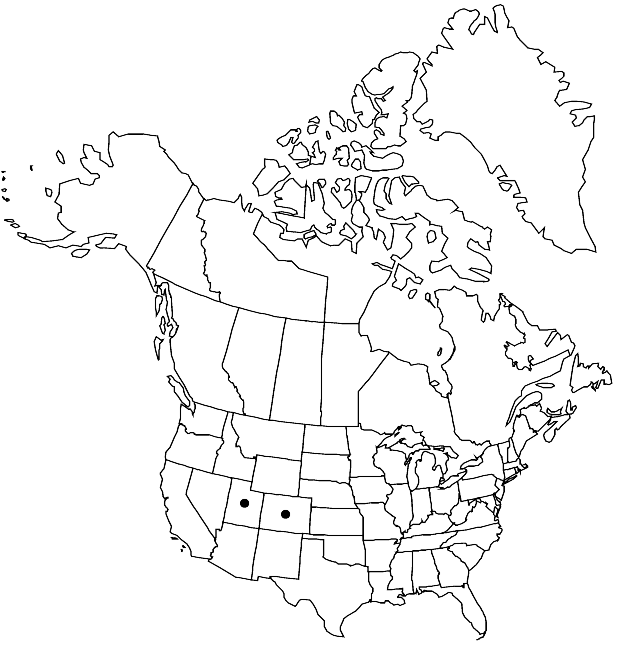Difference between revisions of "Boechera glareosa"
Brittonia 55: 1, fig. 1. 2003.
FNA>Volume Importer |
FNA>Volume Importer |
(No difference)
| |
Revision as of 22:54, 16 December 2019
Perennials; short- to long-lived; sexual; caudex usually not woody. Stems usually 2–6 per caudex branch, arising from margin of rosette near ground surface, 0.8–4 dm, densely pubescent proximally, trichomes simple and short-stalked, 2-rayed, 0.3–0.6 mm, glabrous distally. Basal leaves: blade narrowly oblanceolate, 1–5 mm wide, margins entire or few-toothed, ciliate proximally, trichomes (simple), to 0.9 mm, surfaces densely pubescent, trichomes simple and short-stalked, 2- or 3-rayed, 0.3–0.5 mm. Cauline leaves: 3–6, not concealing stem; blade auricles 0.3–0.6 mm, surfaces of distalmost leaves glabrous. Racemes 7–15-flowered, usually unbranched. Fruiting pedicels divaricate-ascending to horizontal, straight or gently recurved, 4–10 mm, glabrous or sparsely pubescent, trichomes spreading. Flowers ascending at anthesis; sepals pubescent; petals lavender, 3.5–6 × 1–1.5 mm, glabrous; pollen ellipsoid. Fruits divaricate-ascending to horizontal, not appressed to rachis, not secund, usually curved or straight, edges parallel, 2.5–4 cm × 1.2–1.5 mm; valves glabrous; ovules 50–80 per ovary; style 0.05–0.3 mm. Seeds uniseriate, 1–1.5 × 0.7–1 mm; wing usually distal, ca. 0.1 mm wide.
Phenology: Flowering May–Jun.
Habitat: Conglomerate and limestone outcrops in pinyon-juniper and mountain shrub-conifer communities
Elevation: 2000-2600 m
Discussion
Specimens of Boechera glareosa originally were identified as Arabis microphylla var. macounii (= B. macounii) by R. C. Rollins. The former (a sexual species) is distinguished from the latter (an apomictic hybrid) by having wider (1–2 versus 0.5–0.8 mm) petals, fewer (2–9 versus mostly 9–16) cauline leaves, and fewer (7–15 versus 10–33) flowers per inflorescence. Boechera glareosa is known only from Moffat County, Colorado, and Summit and Uintah counties, Utah.
Selected References
None.

